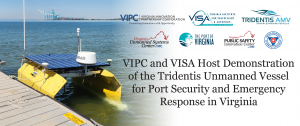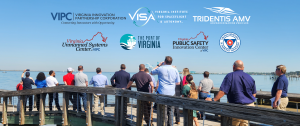VIPC and VISA Host Demonstration of the Tridentis Unmanned Vessel for Port Security and Emergency Response in Virginia
Maritime Autonomous Coastal Monitor (ACM) supports public safety missions for disaster recovery, pollution control and security at seaports and communities.
NORFOLK, VIRGINIA, UNITED STATES, May 2, 2023/EINPresswire.com/ -- Tridentis LLC recently demonstrated its Autonomous Coastal Monitor (ACM) unmanned surface maritime system as a critical tool for first responders to protect Virginia’s maritime resources during the Port Security and Emergency Response pilot project in Hampton Roads. The project is sponsored by the Virginia Innovation Partnership Corporation (VIPC) and the Virginia Institute for Spaceflight and Autonomy (VISA) at Old Dominion University (ODU). The demonstration was performed at the ODU Sailing Center in Norfolk.
During the demonstration, Tridentis, which is headquartered in Alexandria with offices in Norfolk, showed how the ACM addresses three priorities for public safety: disaster recovery, pollution control and security.
“The ACM is a pickup truck for the ocean because it can do difficult things cheaply,” said David Jochum, the president and founder of Tridentis. “The ACM allows the operator to let the robots do the often boring and sometimes dangerous work of collecting data on the water to facilitate various mission sets.”
In addition to the funding VIPC provided to Tridentis for the demonstration project, the company was awarded a Phase III Small Business Innovation Research (SBIR) federal grant to advance the development of the ACM, which was manufactured in Northern Virginia.
“Tridentis is a member of the vibrant ecosystem of technology entrepreneurs who have successfully launched and expanded their companies in Virginia,” said Tracy Tynan, director of the Unmanned Systems Center at VIPC. “VIPC provides numerous investment and grant programs as well as federal contracting assistance to continue the growth of small technology businesses, including unmanned systems.”
The ACM features a Small Waterplane-Area Twin-Hull (SWATH) design with a large deck space that provides stability in waves up to one meter. The platform’s autonomous capabilities are compliant with international maritime regulations for collision avoidance. It is also environmentally sustainable, with battery banks powered by solar cells, which enable eight hours of daily use. The propulsion system may also draw additional energy from a low-emission generator when it is needed for backup and extended operations.
“An unmanned maritime system such as the ACM is a useful force-multiplier for first responders, especially during disaster recovery,” said Chris Sadler, director of VIPC’s Public Safety Innovation Center (PSIC). “These vessels can quickly perform routine assignments that are critical to restoring maritime operations, such as recovering channel markers or identifying debris that may be hazardous to navigation.”
The ACM has a modular sensor design capable of simultaneous operation to support the more than 100 sensors listed by the National Oceanic and Atmospheric Administration (NOAA). They include multiple marine, sea-air interface and atmospheric sensor installations.
“The ACM is sensor agnostic and has the payload capacity to accommodate just about any sensor type,” said William Latham, chief technology officer at Tridentis. “The biggest challenge is transmitting the data to the shore. The ACM can be outfitted with a range of communications equipment depending on the customer’s requirements, including Wi-Fi, mobile radio, wireless broadband and even satellite communications, to provide connectivity with the data onboard the vessel.”
Tridentis is one of five Virginia companies selected to participate in the project, which VIPC and VISA launched in 2021. Public safety agencies from throughout Hampton Roads were consulted about the use of unmanned systems to benefit their security and life-saving missions to determine the parameters of the study. The region includes the Port of Virginia and numerous military installations and government research centers. It also has a large population, with six of the state’s 10 biggest cities located in the area.
“Maritime has a tremendous impact on Virginia’s economy,” said Dr. David Bowles, executive director of VISA. “Tridentis has developed an innovative platform that is capable of facilitating storm recovery, containing hazardous spills and maintaining security at our seaports and naval bases, which are among the world’s largest and most strategic.”
About Virginia Innovation Partnership Corporation (VIPC): VIPC: Connecting innovators with opportunities. As the nonprofit operations arm of the Virginia Innovation Partnership Authority (VIPA), VIPC is the commercialization and seed stage economic development driver in the Commonwealth that leads funding, infrastructure, and policy initiatives to support Virginia’s innovators, entrepreneurs, startups, and market development strategies. VIPC collaborates with local, regional, state, and federal partners to support the expansion and diversification of Virginia’s economy.
Programs include: Virginia Venture Partners (VVP) | VVP Fund of Funds (SSBCI) | Virginia Founders Fund (VFF) |Commonwealth Commercialization Fund (CCF) | Petersburg Founders Fund (PFF) | Smart Communities | The Virginia Smart Community Testbed | The Virginia Unmanned Systems Center | Virginia Advanced Air Mobility Alliance (VAAMA) | The Public Safety Innovation Center |Entrepreneurial Ecosystems | Regional Innovation Fund (RIF) | Federal Funding Assistance Program (FFAP) for SBIR & STTR | University Partnerships | Startup Company Mentoring & Engagement. For more information, please visit www.VirginiaIPC.org. Follow VIPC on Facebook, Twitter, and LinkedIn.
About VISA: The Virginia Institute for Spaceflight and Autonomy (VISA), located on the Eastern Shore, is chartered to grow the entrepreneurial ecosystems for space flight and autonomy. The Institute is the hub to leverage Virginia’s world-class assets in space launch, autonomous systems, modeling and simulation and data science to solve real-world problems. Through industry, academic and governmental agency partnerships, VISA’s vision is to create an environment of research, technology, commercialization, and educational opportunities to grow the spaceflight and autonomous systems industry. For more information, please visit www.visaatodu.org.
About Tridentis: Tridentis, LLC is a professional engineering, logistics and program management firm founded in 2006 that is focused on providing services to the Department of Defense, United States Coast Guard, Military Sealift Command, National Oceanographic and Atmospheric Agency, US Army Corps of Engineers, allied foreign militaries and a variety of other Federal Agencies and commercial customers. We are a registered small business headquartered in Washington, DC, which gives us the unique ability to provide our customers with quick access to our personnel with diverse technical backgrounds. As a growing small business, our capabilities are constantly expanding, and currently include Naval Architecture & Marine Engineering, Structural Engineering, Integrated Logistics Support and Program Management. We provide our customers with accurate and cost-effective solutions to their complex problems. For more information, please visit www.tridentis.com.
Angela Costello, Vice President of Communications
Virginia Innovation Partnership Corporation (VIPC)
angela.costello@VirginiaIPC.org
Visit us on social media:
Facebook
Twitter
LinkedIn
Legal Disclaimer:
EIN Presswire provides this news content "as is" without warranty of any kind. We do not accept any responsibility or liability for the accuracy, content, images, videos, licenses, completeness, legality, or reliability of the information contained in this article. If you have any complaints or copyright issues related to this article, kindly contact the author above.


